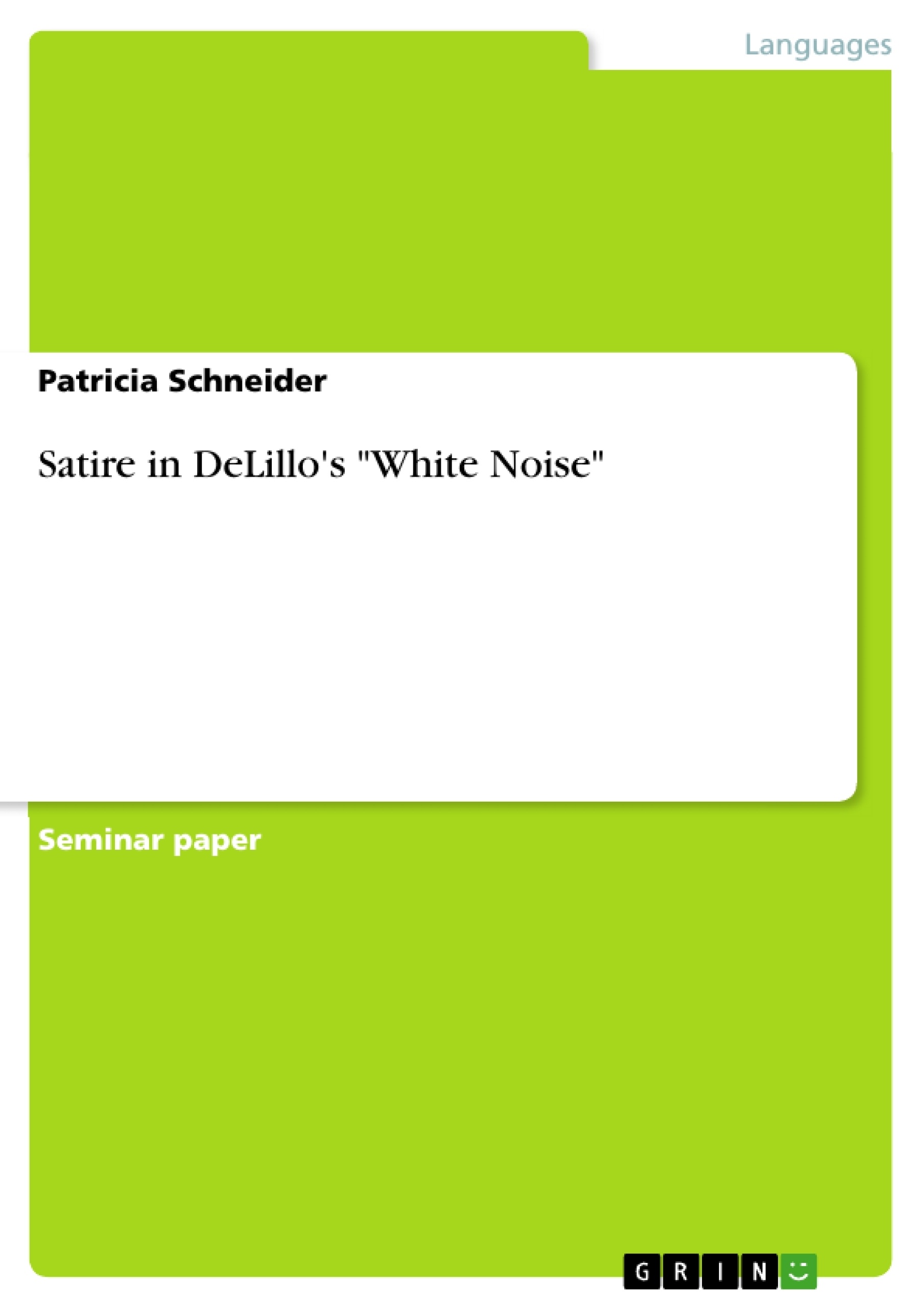Excerpt
Satire, sarcasm, irony – these are all related stylistic devices but there are crucial differences. Both satire and sarcasm generally ridicule human behaviour but only the satire implies the intent of improving the ridiculed behaviour. Irony on the other hand includes an incongruity or a connection that goes beyond the most obvious meaning and can therefore be used to underline the ridicule of the satire or the sarcasm.
In White Noise DeLillo uses the satire to ridicule human behaviour in four different respects: to satirize the human behaviour related to consumerism, to satirize the human behaviour that is determined by the media, to satirize the behaviour of the novel’s characters in their role in the family and to satirize Jack’s academic life by depicting the lack of seriousness in his studies.
However, DeLillo not only uses the satire to ridicule the behaviour of the novel’s protagonist and his family but also shows the difficulties that arise when trying to improve the satirized behaviour.
The satire of consumerism is already hinted at right at the beginning of the novel when DeLillo describes an annual autumn ritual – the arrival of the station wagons on the campus. By using the stylistic device of a list, DeLillo exposes that the station wagons contain electronic apparatuses, sports equipment and a lot of junk food (DeLillo 3). It is striking that the wagons contain no books – as it might be suspected that the students may need them for their studies. Thus, the parents supply their children with pleasure-seeking goods rather than material for their studies.
However, the satire of consumerism becomes most apparent in the many scenes that take place in the supermarket. As the supermarket is chosen as a location for many scenes, it gains a particular importance. It is striking that Jack describes the supermarket in an exclusively positive way:
But the supermarket did not change except for the better. It was well-stocked, musical and bright. This was the key, it seemed to us. Everything was fine, would continue to be fine, would eventually even get better as long as the supermarket did not slip. (DeLillo 170)
Thus, it can be observed that Jack visualizes the supermarket as an institution that has a particular force to influence his life. When the Gladneys run into Murray Siskind in the supermarket Murray reveals that he shares Jack’s positive, exaggerated image of the supermarket. Murray even regards the supermarket as a temple in which he can find everything he desires (DeLillo 37). Therefore, it seems as if the characters often go to the supermarket without the intent or immediate need of buying goods but rather just to be there. However, what is most satirized in White Noise is the consumer behaviour of Jack and his family. Jack tends to buy things not because he needs them but rather because he wants to own them. Therefore, he buys for example “fifty feet of Manila hemp just to have it around, show it to [his] son, talk about where it comes from, how it’s made” (DeLillo 82). Jack also shops in order to compensate negative feelings: When he meets a colleague at the supermarket who tells them that he looks like “[a] big, harmless, aging, indistinct sort of guy” (DeLillo 83) without his gown and glasses, Jack is put “into the mood to shop” (DeLillo 83):
I shopped with reckless abandon. I shopped for immediate needs and distant contingencies. I shopped for its own sake, looking and touching, inspecting merchandise I had no intention of buying, then buying it. […] I began to grow in value and self-regard. I filled myself out, found new aspects of myself, located a person I’d forgotten existed. (DeLillo 84)
In this extract the satire of consumer behaviour becomes especially apparent: Jack admits that he has no intention of buying certain goods but still buys them.
According to Duvall (178), “Jack replaces his inauthentic Hitler aura with the equally inauthentic aura of shopping, which he experiences, however, as authentic.” Jack’s shopping frenzy leads him to believe that he gains “existential credit” (DeLillo 84) by spending money on goods. The underlying idea of this belief can be deduced from Descartes’ philosophical maxim and thus be formulated as “I consume, therefore I am.” While shopping Jack seems to be the centre of the family. Ferraro (20) claims that “consumerism produces what we might call an aura of connectedness among individuals.” This connectedness can also be observed during Jack’s shopping frenzy as the children start to make his decisions whenever he is not able to decide (DeLillo 83).
As Jack obviously tends to buy goods that he actually does not need, it is not surprising that it is described three times in the novel how Jack throws things away (DeLillo 222, 262, 294). Garbage as the representation of the other end of consumerism can also be found when Jack searches the Dylar in the garbage compactor (DeLillo 258). Thus, DeLillo projects his satire of consumerism not only onto the description of Jack buying useless goods but also by demonstrating the result of his thoughtless shopping by describing the garbage produced by the Gladneys’ consumer behaviour.
However, a shopping frenzy like the one described beforehand can not only be observed for Jack, but also for older people. When heavy snowfall is predicted Jack states that “[t]he old people shopped in a panic. When TV didn’t fill them with rage, it scared them half to death” (DeLillo 167-168),
This statement not only satirizes the consumer behaviour of the old people but also the fact that it is the media that leads the people to such behaviour. The satire of the media will therefore be examined in the following section.
[...]
- Quote paper
- Patricia Schneider (Author), 2009, Satire in DeLillo's "White Noise", Munich, GRIN Verlag, https://www.grin.com/document/159331
Publish now - it's free






















Comments